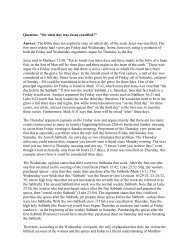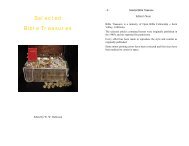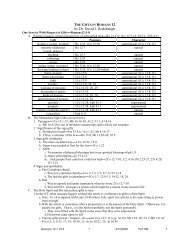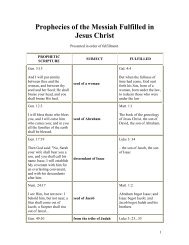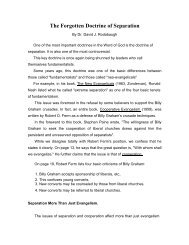Substitution and HUPER - Hope of the Glory
Substitution and HUPER - Hope of the Glory
Substitution and HUPER - Hope of the Glory
You also want an ePaper? Increase the reach of your titles
YUMPU automatically turns print PDFs into web optimized ePapers that Google loves.
<strong>Substitution</strong> <strong>and</strong> <strong>HUPER</strong><br />
A Big Doctrine <strong>and</strong> a Little Word<br />
"Once quite an argument was made against <strong>the</strong> substitutionary <strong>the</strong>ory on <strong>the</strong> ground<br />
that Paul in <strong>the</strong> great passages (cf. 2 Cor, 5 <strong>and</strong> Rom, 5) employs huper ra<strong>the</strong>r than<br />
anti, This anti<strong>the</strong>sis between anti <strong>and</strong> huper was imaginary as a matter <strong>of</strong> fact. Nei<strong>the</strong>r<br />
word in itself means substitution. It is a secondary idea in each instance. Anti literally<br />
means 'at <strong>the</strong> end <strong>of</strong>' <strong>and</strong> so suggests contrast, succession substitution, opposition, as <strong>the</strong><br />
case may be Huper means literally `over' <strong>and</strong> <strong>the</strong> context alone can decide <strong>the</strong> resultant<br />
meaning which may be 'concerning,' 'beyond,' 'in behalf <strong>of</strong>,' `instead <strong>of</strong>,' The ancient<br />
Greek writers employed anti, pro or huper for substitution as <strong>the</strong>y wished. In <strong>the</strong> Alcestis<br />
<strong>of</strong> Euripides, where <strong>the</strong> substitutionary death <strong>of</strong> Alcestis for her husb<strong>and</strong> is <strong>the</strong> point <strong>of</strong><br />
<strong>the</strong> story, we find huper seven times, while anti <strong>and</strong> pro toge<strong>the</strong>r have fewer uses. The<br />
sut:stitutiorrary use <strong>of</strong> huper appears in ... So <strong>the</strong>n it was never fair to say that <strong>the</strong> Greek<br />
idiom required anti for <strong>the</strong> idea <strong>of</strong> substitution. One followed his whims in <strong>the</strong> matter.<br />
For instance, Pausanias (Ruger), Die Prapositionen bei Pausanias, p. l2) employed huper<br />
twice as <strong>of</strong>ten as anti.<br />
Moulton (Prolegomena, p, 165), remarks that huper is 'more colourless' as compared with<br />
anti.<br />
"But <strong>the</strong> papyri, particularly <strong>the</strong> business documents, show that Paul is following<br />
current usage when he prefers huper for <strong>the</strong> idea <strong>of</strong> substitution. The instances in <strong>the</strong><br />
papyri are far too numerous to quote.... Certainly in all <strong>the</strong>se instances <strong>the</strong> writing is<br />
done on behalf <strong>of</strong> one, but one cannot stop <strong>the</strong>re. Winer (Winer-Thayer, p. 382) rightly<br />
says: 'ln most cases one who acts in behalf <strong>of</strong> ano<strong>the</strong>r takes his place.' This is absolutely<br />
true in <strong>the</strong> case <strong>of</strong> <strong>the</strong> recurrent idiom so common in <strong>the</strong> papyri, where a scribe writes a<br />
document in behalf <strong>of</strong> <strong>and</strong> instead <strong>of</strong> one who does not know letters. The scribe writes<br />
'for' one who is not able to write.<br />
Robertson <strong>the</strong>n gives a number <strong>of</strong> examples where huper means "instead <strong>of</strong>", Indeed he states<br />
([3], p, 38):<br />
"It is needless to add more. They tell <strong>the</strong> same almost monotonous story <strong>of</strong> <strong>the</strong><br />
substitutionary use <strong>of</strong> huper.<br />
"when we turn to <strong>the</strong> New Testament from <strong>the</strong> papyri <strong>the</strong>re can, <strong>of</strong> course, be no<br />
grammatical reluctance to allowing <strong>the</strong> same usage for huper if <strong>the</strong> context calls for it.<br />
Theological prejudice must be overruled,"<br />
A number <strong>of</strong> references are listed where Robertson considers <strong>the</strong> issues to be clear: John 11:50;<br />
Gal, 3:13; Mark 14:24 2 Cor, 5:15; Rom, 5:6, ff; 8:32; Titus 2 :14; Heb, 2:9; etc, Regarding <strong>the</strong>se<br />
passages, he even states, ". , <strong>the</strong>re is no room left for protest from <strong>the</strong> side <strong>of</strong> grammar,"<br />
Expressions like this occur several times in connection with <strong>the</strong>se passages. On page 41, he<br />
concludes, "<strong>the</strong> presumption is now in favour <strong>of</strong> <strong>the</strong> use <strong>of</strong> hyper for <strong>the</strong> idea <strong>of</strong> substitution."<br />
What a fantastic parallel! A scribe writes in <strong>the</strong> place <strong>of</strong> an illiterate who is helpless: Christ<br />
died in <strong>the</strong> place <strong>of</strong> totally depraved sinners who are spiritually helpless.<br />
Page # 6<br />
by Dr. David Rodabaugh







